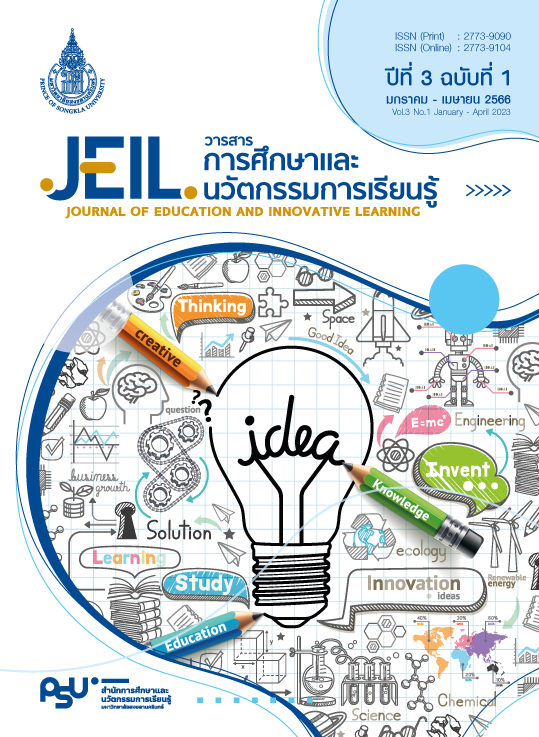แนวทางการพัฒนาสมรรถนะเชิงดิจิทัลสำหรับการจัดการศึกษาของมหาวิทยาลัยเทคโนโลยีราชมงคลในประเทศไทย
Main Article Content
บทคัดย่อ
การวิจัยนี้มีวัตถุประสงค์เพื่อศึกษาคุณลักษณะ องค์ประกอบ และเสนอแนวทางการพัฒนาสมรรถนะเชิงดิจิทัลสำหรับการจัดการศึกษาของมหาวิทยาลัยเทคโนโลยีราชมงคลในประเทศไทย โดยการศึกษาจากเอกสารและข้อมูลเชิงประจักษ์ตามกรอบสมรรถนะเชิงดิจิทัล 4 ด้าน กลุ่มตัวอย่าง ได้แก่ ผู้บริหารและบุคลากร จำนวน 360 คน จาก 9 สถาบันในประเทศไทย โดยใช้ระเบียบวิธีการวิจัยแบบผสานวิธีระหว่างเชิงปริมาณและเชิงคุณภาพ การวิเคราะห์องค์ประกอบเชิงสำรวจ การตรวจสอบด้วยวิธีวิทยาวิจัยสามเส้าด้านข้อมูล และการยืนยันร่างแนวทางโดยวิธีการสนทนาอิงผู้เชี่ยวชาญ ผลการวิจัยพบว่า แนวทางการพัฒนาสมรรถนะเชิงดิจิทัลสำหรับการจัดการศึกษาของมหาวิทยาลัยเทคโนโลยีราชมงคลในประเทศไทยมีองค์ประกอบหลัก ได้แก่ 1) ด้านพุทธิพิสัย 2) ด้านทักษะพิสัย และ 3) ด้านจิตพิสัย องค์ประกอบย่อย ได้แก่ (1) พื้นฐานคอมพิวเตอร์และดิจิทัล (2) การเข้าถึงดิจิทัล (3) การใช้ดิจิทัล (4) การผลิตและการสร้างสรรค์สื่อดิจิทัล (5) การสื่อสารดิจิทัล (6) การจัดการสื่อดิจิทัล และ (7) การประเมินค่าดิจิทัล วิธีการพัฒนาสมรรถนะเชิงดิจิทัลสามารถทำได้ 5 วิธี ได้แก่ (1) การเรียนรู้และพัฒนาด้วยตนเอง (2) การเรียนรู้ผ่านระบบออนไลน์ (3) การใช้กรณีศึกษา (4) การเรียนรู้ผ่านเอไอ และ (5) การฝึกอบรมเชิงปฏิบัติการ ผลการวิจัยสามารถนำไปใช้เป็นแนวทางในการพัฒนาสมรรถนะเชิงดิจิทัลสำหรับบุคลากรตามเกณฑ์มาตรฐานคุณวุฒิระดับอุดมศึกษาต่อไป
Article Details

อนุญาตภายใต้เงื่อนไข Creative Commons Attribution-NonCommercial-NoDerivatives 4.0 International License.
เนื้อหาและข้อมูลในบทความที่ตีพิมพ์ในวารสารการศึกษาและนวัตกรรมการเรียนรู้ ถือเป็นข้อคิดเห็นและความรับผิดชอบของผู้เขียน ซึ่งกองบรรณาธิการวารสาร ไม่จำเป็นต้องเห็นด้วยหรือร่วมรับผิดชอบใด ๆ และไม่สงวนสิทธิ์การคัดลอกบทความเพื่อใช้ประโยชน์ทางวิชาการ แต่ให้อ้างอิงข้อมูลแสดงที่มาของบทความทุกครั้งที่นำไปใช้ประโยชน์
เอกสารอ้างอิง
Dervenis, C., Fitsilis, P., & Iatrellis, O. (2022). A review of research on teacher competencies in higher education. Quality Assurance in Education, 30(2), 199-220. doi:10.1108/QAE-08-2021-0126
Holmes, J., Moraes, O. R., Rickards, L., Steele, W., Hotker, M., & Richardson, A. (2022). Online learning and teaching for the SDGs – exploring emerging university strategies. International Journal of Sustainability in Higher Education, 23(3), 503-521. doi:10.1108/IJSHE-07-2020-0278
Isoda, M., Estrella, S., Zakaryan, D., Baldin, Y., Olfos, R., & Araya, R. (2021). Digital competence of a teacher involved in the implementation of a cross-border lesson for classrooms in Brazil and Chile. International Journal for Lesson and Learning Studies, 10(4), 362-377. doi:10.1108/IJLLS-05-2021-0045
Lee, J. J., & Meng, J. (2021). Digital competencies in communication management: a conceptual framework of Readiness for Industry 4.0 for communication professionals in the workplace. Journal of Communication Management, 25(4), 417-436. doi:10.1108/JCOM-10-2020-0116
Ministry of Higher Education, Science, Research and Innovation. (2019). Higher education act B.E. 2019. Bangkok: Shipping and Parcel Printing Houses. [in Thai]
Office of the National Digital Economy and Society Commission. (2018). Digital competence framework for Thai citizens. Retrieved from https://web.parliament.go.th/assets/portals/1/files/digital_competence_framework_for_thai_citizens.pdf [in Thai]
Okunlaya, R. O., Syed Abdullah, N., & Alias, R. A. (2022). Artificial intelligence (AI) library services innovative conceptual framework for the digital transformation of university education. Library Hi Tech, 40(6), 1869-1892. doi:10.1108/LHT-07-2021-0242
Parkatti, A., Saari, T., Tammelin, M., & Villi, M. (2022). Framing digital competence in media work - The case of Finland. International Journal of Sociology and Social Policy, 42(13/14), 15-29. doi:10.1108/IJSSP-02-2022-0040
Pittman, J., Severino, L., DeCarlo-Tecce, M. J., & Kiosoglous, C. (2021). An action research case study: digital equity and educational inclusion during an emergent COVID-19 divide. Journal for Multicultural Education, 15(1), 68-84. doi:10.1108/JME-09-2020-0099
Phakamach, P., Senarith, P., & Wachirawongpaisarn, S. (2022a). ICT systems development guidelines for educational innovation management of Rajamangala University of Technology in Thailand. Journal of Education and Innovative Learning, 2(2), 109-130. [in Thai]
Phakamach, P., Senarith, P., & Wachirawongpaisarn, S. (2022b). The metaverse in education: the future of immersive teaching & learning. RICE Journal of Creative Entrepreneurship and Management, 3(2), 75-88.
Webb, A., McQuaid, R. W., & Webster, C. W. R. (2021). Moving learning online and the COVID-19 pandemic: a university response. World Journal of Science, Technology and Sustainable Development, 18(1), 1-19. doi:10.1108/WJSTSD-11-2020-0090


